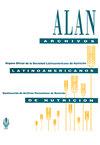Anthropometry, dietetic habits and sleepiness in Ecuadorian adults
IF 0.3
4区 医学
Q4 NUTRITION & DIETETICS
引用次数: 0
Abstract
The reduction of hours of sleep affects the physical and mental health of people. Having unhealthy sleep habits are associated with a greater occurrence of daytime sleepiness, which in turn has been related to poorer nutritional status. The objective of this study was to relate food intake, anthropometric measurements, and daytime sleepiness in Ecuadorian adults. Non-experimental, cross-sectional study, the sample included 400 men and women between 18 and 65 years of age, who attended an outpatient consultation of general medicine, family medicine, and traumatology services of a public hospital in Quito-Ecuador. Anthropometric and body composition measurements were measured using tetrapolar bio-impedance, following the recommendations of the International Society for the Advancement of Anthropometry (ISAK). Caloric intake was measured using a 24-hour recall and for daytime sleepiness (DS) the Epworth questionnaire was used. Statistical analyzes were performed using R. From the sample 56.5% presented DS, which affected women more frequently compared to men (p < 0.05). Differences were found between body measurements and dietary intake between groups of people with and without DS. Caloric intake, waist circumference, percentage of fat mass were higher in people with DS (p < 0.05), while muscle mass was higher in subjects without DS (p <0.05). No differences were found concerning visceral fat. We conclude that SD is related to less healthy values in terms of dietary intake and anthropometric measures.厄瓜多尔成年人的人体测量、饮食习惯和嗜睡
睡眠时间的减少会影响人们的身心健康。有不健康的睡眠习惯会导致白天更容易犯困,而白天犯困又与较差的营养状况有关。本研究的目的是将厄瓜多尔成年人的食物摄入量、人体测量值和白天嗜睡联系起来。非实验性横断面研究,样本包括400名年龄在18至65岁之间的男性和女性,他们参加了基多-厄瓜多尔一家公立医院的普通医学、家庭医学和创伤科门诊会诊。根据国际人体测量学进步协会(ISAK)的建议,使用四极生物阻抗测量人体测量和身体成分。热量摄入采用24小时回忆法测量,白天嗜睡(DS)采用Epworth问卷。采用r进行统计学分析。56.5%的患者出现DS,女性发病频率高于男性(p < 0.05)。在患有和不患有退行性痴呆的人群之间,发现了身体测量和饮食摄入的差异。退行性椎体滑移患者的热量摄入、腰围、脂肪质量百分比较高(p <0.05),而非退行性椎体滑移患者的肌肉质量较高(p <0.05)。在内脏脂肪方面没有发现差异。我们得出结论,SD与饮食摄入和人体测量值方面的不健康值有关。
本文章由计算机程序翻译,如有差异,请以英文原文为准。
求助全文
约1分钟内获得全文
求助全文
来源期刊
CiteScore
0.50
自引率
0.00%
发文量
31
期刊介绍:
Archivos Latinoamericanos de Nutrición (ALAN) is the official publication of the Sociedad Latinoamericana de Nutición (SLAN), for the dissemination of knowledge in the fields of food and nutrition, principally throughout the American Hemisphere. Articles in Spanish, English, Portuguese and French are accepted, both from the Society members and from nonmembers, in the following categories: 1. General articles (critical scientific reviews); 2. Research articles (originals); 3. Papers in applied nutrition (analytical results from intervention programs and discussion of reconmendations of practical application), and 4. Letters to Editor (short comments of general interest or about scientific facts and results previously published in Archives).

 求助内容:
求助内容: 应助结果提醒方式:
应助结果提醒方式:


